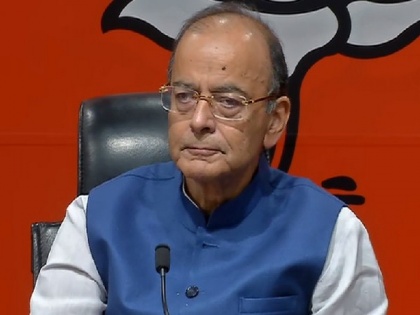From GST to demonetisation, Jaitley was instrumental to Centre's many key policy decisions
By ANI | Published: August 24, 2019 08:28 PM2019-08-24T20:28:41+5:302019-08-24T20:45:02+5:30
BJP stalwart and former Finance Minister Arun Jaitley is credited to have played an instrumental role in meticulously planning, articulating and executing some major schemes including the Jan Dhan Yojana, demonetisation, and Goods and Services Tax (GST).

From GST to demonetisation, Jaitley was instrumental to Centre's many key policy decisions
BJP stalwart and former Finance Minister Arun Jaitley is credited to have played an instrumental role in meticulously planning, articulating and executing some major schemes including the Jan Dhan Yojana, demonetisation, and Goods and Services Tax (GST).
Pradhan Mantri (PM-JDY) was floated in 2014 with the purpose of financial inclusion and providing banking services to all households in the country. The scheme encompasses opening of zero balance accounts, easy loans, insurance and pension. PM-JDY left its impact in rural India.
This scheme also envisages the extension of Direct Benefit Transfer (DBT) under various government schemes through bank accounts of the recipients. The Kisan Credit Card (KCC) was also being linked to the RuPay platform.
Jaitley is also known for meticulously designing the GST, which amalgamated a large number of Central and State taxes into a single tax to mitigate the ill effects of cascading or double-taxation, thus paving the way for a common national market. Jaitley oversaw the implementation of GST.
The sensitive decision of demonetisation was also taken by Prime Minister Narendra Modi government while Jaitely was the in-charge of Finance Ministry. Despite the efforts of the opposition to portray demonetisation as "anti-people" and implementation of GST as "flawed", Jaitley and other BJP leaders ensured the ruling alliance did not lose the political narrative and brought about correctives based on the feedback from the ground.
He regularly wrote articles and blogs explaining the rationale of the Modi government's decision and was pivotal to the party's reach out to the intelligentsia. It contributed to building the narrative for the BJP's emphatic victory in this year's Lok Sabha elections.
The Insolvency and Bankruptcy Code (IBC), which aims to protect the interests of small investors and make the process of doing business less cumbersome, was introduced in the Lok Sabha on December 21, 2015 by Finance Minister Jaitley. It seeks to consolidate the existing framework by creating a single law for insolvency and bankruptcy.
The former Finance Minister is also known for playing a central role in the amalgamation of public sector banks with major being the cohesion of Bank of Baroda, Dena Bank, and Vijaya Bank.
Facing health issues, Jaitley wrote to Prime Minister Narendra Modi ahead of swearing-in May and opted out of the new government. In a special gesture, Modi visited him at his residence a day ahead of taking the oath.
Jaitley defended the Modi government schemes and policies in the Parliament and was one of BJP's most successful spokespersons with his dexterity in English and Hindi and a key face to reach out to the middle class. He articulated his points with sharpness and crispness and often with catchy phrases that were easy to turn into headlines.
( With inputs from ANI )
Open in app